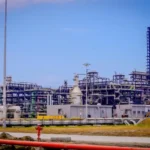Laolu Akande, a former Presidential Aide, has described the Dangote Refinery as “bad business” for the Nigerian National Petroleum Corporation Limited (NNPCL).
He said this during an interview with Sunrise Daily on Channels TV, citing systemic corruption issues.
“What the Dangote Refinery is going to do essentially is to ensure our energy security. Namely that ultimately there will be fuel in this country. But, what most people are not paying attention to is that Dangote Refinery is ‘bad business’ for the system, the NNPCL, and the system of corruption,” Akande noted.
He elaborated on the conflict of interest arising from the refinery’s establishment, pointing out that the NNPCL’s major business revolves around importing refined petroleum, a lucrative segment marred by corruption. “What is happening essentially is that the major aspect of NNPCL’s business is this idea of importing refined petroleum. It’s a big deal in NNPCL. It’s a big business. Dangote comes and says, ‘You know what? I have it here.’ There are a lot of interests that are at stake. And that’s the only reason why we are having this kind of drama [the back and forth press releases between NNPC and Dangote Refinery].”
- Onaiyekan flays Tinubu’s reforms, says middle-class becoming poor
- Maiduguri flood: Dantata donates N1.5bn, NEDC N3bn to victims
Akande further criticized the ongoing conflict between NNPC and Dangote Refinery, attributing it to the refinery disrupting entrenched interests that benefit from the current system where NNPC has been the sole importer of refined petrol for decades. “Dangote has messed up a lot of stakes that have vested interests or benefit rightly or wrongly in the current system where NNPC is the only sole importer of refined petrol for two to three decades.”
Despite these concerns, Akande expressed surprise that the Nigerian President has not intervened more decisively in the matter. “I’m surprised that Mr. President hasn’t taken up this matter so that you can restore confidence in the regulatory process,” he remarked, emphasizing the need for presidential action to address the issues and restore integrity to the regulatory framework governing Nigeria’s petroleum sector.

 Join Daily Trust WhatsApp Community For Quick Access To News and Happenings Around You.
Join Daily Trust WhatsApp Community For Quick Access To News and Happenings Around You.


